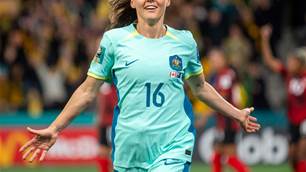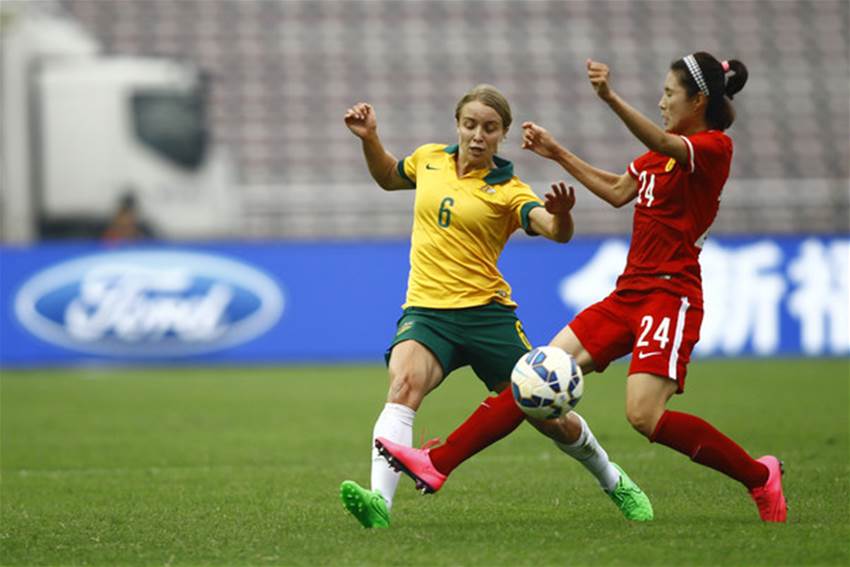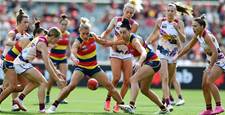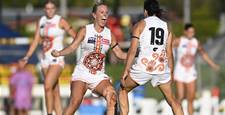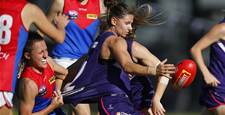Georgia Yeoman-Dale stated her case for a regular place in the Matildas squad (Photo: Getty Images)
Georgia Yeoman-Dale stated her case for a regular place in the Matildas squad (Photo: Getty Images)
The Matildas truly began their journey to Rio earlier this week with two matches against 2015 FIFA Women's World Cup participants China (quarter finalists) and England (third place).
In anticipated tight contests, Australia recorded a 1-1 draw with China – although still scratching our heads at the penalty – and a 1-0 loss to England.
Head coach Alen Stajcic used these matches to assess new talent - Georgia Yeoman-Dale, Amy Harrison, Tara Andrews and Caitlin Cooper – and increase the versatility of the squad with personnel and formation changes.
It is part of a process to select an 18 player squad – down from the World Cup squad of 23 – for February/March 2016's Olympic Qualifiers.
[More: Australia fall to England 1-0]
These are observations from the two encounters:
Yeoman-Dale stakes her claim: Since 2011, the right-back duties for the national team was essentially a lock between Caitlin Foord and Teigen Allen. However the last 12 months has seen Foord almost exclusively in that role with the a number of auditions for back-ups seemingly not working out.
The problem (read that loosely) with Foord is that she is equally dangerous and effective at left back or higher up the pitch but freeing her up requires that back-up right back. Enter Georgia Yeoman-Dale.
Like any good Australian full back, Yeoman-Dale has been converted from an attacker to an attacking full back. A move to the Newcastle Jets proved fruitful with the 21 year-old having a standout in Season 7 of the W-League.
In her first starts for Australia against China and England, she demonstrated that she has all the hallmarks of pace, dribbling ability and the engine to patrol that flank. That's not to say there weren't times she was caught out of position or gave the ball away cheaply but that is where frequent international experience will come in.
Kellond-Knight is still really good and Alleway continues to impress: The World Cup saw Kellond-Knight emerge is a top class holding midfielder and her time in Germany (although not a winning one at present) seems to have instilled even more confidence and assurance in her game. Kellond-Knight performed as the heart and the head of the team breaking up play, covering gaps and full back raids and keeping the ball moving for Australia.
While Alleway didn't receive as many plaudits during the World Cup, the 25 year-old looks to have become the key central defender with the pace to take on smaller, quicker forwards as well as aerial ability and body strength for more physically dominant attackers.
Four months is a long time in football: The last time the Matildas were in action was back on 22 June and several times it showed. Passes went astray, runs and passes weren't quite timed, the lines weren't quite in synch.
That could be down to some new players introduced but also showed just how sharp the team was four months ago and how much can be achieved with a full time program. In saying that the fundamentals of the team game plan were still sound and several passages of play gave a reminder of the best of the Matildas.
Australia still needs a Plan B: The World Cup demonstrated that the Matildas have a pretty good Plan A and when it works, against the right opposition, it has also demonstrated in can undo some of the best teams in the world. However, when another nation can match Australia at their game (Japan) or nullify them, there needs to be an ability to switch it up.
The first half of the match against England, were able implement their game plan and could easily have had a goal to show for it. But in the second half England adjusted and, as they did to Japan (despite losing narrowly) and Germany in the World Cup, were able to blunt Australia's game
Rio Olympics qualifying is going to be tough: Not that one was needed but the Three Nations Tournament was a reminder that the AFC Olympic Qualifiers are going to be extremely tough. The tightness of the matches with the world no. 5 and 15 mirrors that of the AFC.
Only two spots are available for six teams with an average ranking of 13, with four of those nations in the Top 15. Playing every other day, Australia's draw will be critical as will the roster. A relatively favourable draw could allow more squad rotation to help combat the fatigue that appeared to have crept into the starting XI by the World Cup Quarter-Final
For the program, qualifying for the Rio Olympics is paramount. With the Australian Sports Commission's Winning Edge strategy, non-qualification will continue to have funding implications as shown in the past by the loss of Institute of Sports programs in the Australia's capital cities. On the other hand, returning to the status of an Olympic sport will open up new and significant funding for women's football. But it's going to be tough.
Related Articles
.jpeg&h=172&w=306&c=1&s=1)
Victory duo eager to prove worth to Matildas
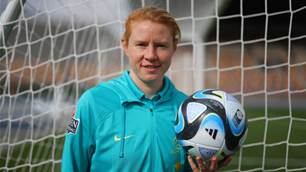
Matildas turn up heat on A-Leagues, government
